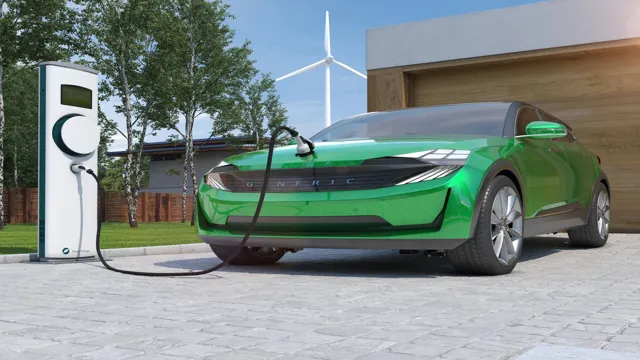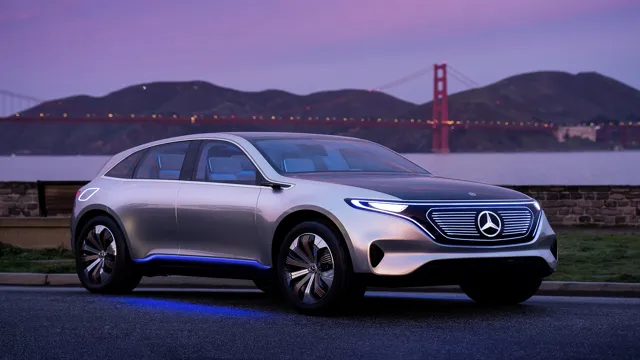Decoding the Future of Mobility: Understanding the Wonders of Electric Cars
Electric cars have been acquiring immense attention recently, and it’s no surprise! With numerous environmental benefits and significant advancements in their design, electric vehicles appear to be powering the future of transportation. These cars use electricity for power and produce zero emissions, making them a more sustainable alternative to conventional gasoline cars. The transition to electric vehicles is rapidly progressing, and many automakers are now focusing on the production of electric cars.
The prospect of a cleaner and more efficient future has led to an increased interest in electric cars, with many consumers eager to learn more about their advantages and implementation. In this blog post, we will explore the intricate details of electric cars, including their benefits, the technology behind them, and current advances in the industry. So, let’s dive into the world of electric cars together!
Definition
“What is an Electric Car?” An electric car is a revolutionary transportation option that utilizes electric motors and rechargeable batteries as its primary power source. It is designed to be more environmentally-friendly compared to traditional gasoline-powered vehicles since it does not emit any harmful exhaust or pollutants into the air. These cars are perfect for those who want to reduce their carbon footprint and contribute to the fight against climate change.
Electric cars come in various types and models, including plug-in hybrids, battery-electric, and fuel cell cars. Plug-in hybrids have both electric and gasoline-powered engines, while battery-electric cars rely solely on electricity for power. Fuel cell cars, on the other hand, use hydrogen as their primary fuel source to generate electricity.
One of the most significant advantages of electric cars is their cost-effectiveness, especially in the long run. They require less maintenance compared to traditional cars, and the cost of electricity is significantly lower than gasoline prices. Additionally, electric cars are silent, providing a more peaceful and comfortable driving experience.
Overall, electric cars have the potential to change the world’s transportation industry and significantly impact the environment for the better.
What sets electric cars apart from traditional vehicles?
Electric cars are a modern convenience that has taken the automobile industry by storm. These cars are powered by electricity rather than fossil fuels such as gas or diesel. What distinguishes electric cars apart from traditional vehicles is the use of electric motors instead of internal combustion engines.
Electric motors are more efficient than gasoline engines, and they offer higher torque and smoother rides. Moreover, electric cars are eco-friendly. Their engines emit zero emissions, making them an environmentally conscious choice for those who care about the planet.
With electric vehicles, you can also save on fuel costs. Unlike traditional vehicles, you do not need to fill up at a gas station. Simply plug in your electric car to recharge its battery, which can be done at your own garage or at a public charging station.
Ultimately, electric cars offer a modern, sustainable mode of transportation for those seeking cost-effective and environmentally friendly options.

Benefits
Electric cars are an alternative to traditional gasoline-powered vehicles that use electric motors and rechargeable batteries to drive. These vehicles provide several benefits, including being more environmentally friendly by producing zero emissions, contributing to cleaner air and reducing the carbon footprint of drivers. Additionally, electric cars have lower operating costs and require less maintenance due to fewer moving parts and oil changes.
They also offer a quiet and smooth driving experience, reducing noise pollution in populated areas. With advancements in technology, electric cars are becoming more affordable and accessible, making them a practical option for many drivers looking for a sustainable transportation solution. Overall, electric cars are a great option for environmentally conscious drivers who want to save money and enjoy a comfortable driving experience.
Better for the environment, cheaper to maintain, and more efficient.
When it comes to benefits, using environmentally-friendly and energy-efficient technology is always a wise choice. Not only is it better for the environment, but it also offers financial advantages. For example, investing in technologies like solar panels, energy-efficient appliances, and LED lighting can significantly reduce your energy consumption, lowering your utility bills and maintenance costs in the long run.
In addition, eco-friendly technologies typically have a longer lifespan, reducing the frequency of replacements and further reducing the environmental impact and financial burden. Overall, using this technology is a win-win for both your wallet and the planet. It’s like planting a tree: not only is it a small action that contributes to a healthy environment, but it also adds up over time to create long-term benefits.
By incorporating eco-conscious choices in your daily life, you are taking important steps towards a greener future that benefits us all.
Types
If you’re wondering what an electric car is, it’s a vehicle that runs on electricity instead of gasoline. There are actually three main types of electric cars. Battery electric vehicles (BEVs) are solely powered by a rechargeable battery and do not have an internal combustion engine.
Plug-in hybrid electric vehicles (PHEVs) are a mix between BEVs and traditional gas-powered cars. They have both a battery-powered electric motor and a gasoline engine to provide additional range when needed. Finally, hybrid electric vehicles (HEVs) are powered by a combination of gasoline and electricity.
They have a smaller battery than PHEVs and can’t be charged externally. Their electric motor is used to boost the efficiency of the gasoline engine. Each type of electric vehicle has its own unique benefits and limitations based on factors like driving range, cost, and environmental impact.
Battery electric, plug-in hybrid, and hydrogen fuel cell.
When it comes to eco-friendly vehicles, there are three main types: battery electric, plug-in hybrid, and hydrogen fuel cell. Battery electric vehicles run solely on electricity stored in large batteries and have zero emissions, making them an ideal choice for those looking to reduce their carbon footprint. Plug-in hybrids, on the other hand, have both an electric motor and a gasoline engine, allowing them to run on either power source.
This means that they have a longer range than a battery electric vehicle and are a good choice for those who need to travel longer distances but still want to reduce their emissions. Lastly, hydrogen fuel cell vehicles use hydrogen as their fuel source and produce only water as their exhaust, making them an incredibly clean option. However, since hydrogen fuel stations are not yet widespread, they are not as commonly available as the other two types.
No matter which type you choose, all three offer a sustainable and environmentally friendly option for those looking to make a positive impact on the planet.
Battery electric: powered solely by electricity.
When it comes to electric vehicles, there are a few different types to choose from. Battery electric vehicles, also known as BEVs, are powered solely by electricity. This means that they don’t have an internal combustion engine like a traditional gas-powered car.
Instead, they have a battery pack that stores energy and powers an electric motor. There are a few different types of battery electric vehicles to choose from, including all-electric cars, electric SUVs, and electric trucks. Each type of BEV has its own unique features and benefits, so it’s important to do your research and find the one that’s right for you.
All-electric cars are great for commuting and running errands, while electric SUVs are perfect for families who need more space. If you’re looking for a vehicle that can haul heavy loads, an electric truck might be the way to go. No matter what type of BEV you choose, you’ll be able to enjoy the benefits of emission-free driving and a quieter, more peaceful ride.
So why not give it a try and see what all the fuss is about?
Plug-in hybrid: uses both electricity and gasoline.
When it comes to hybrid vehicles, there are various types to choose from. One popular type is the plug-in hybrid, which is designed to use both electricity and gasoline. Essentially, plug-in hybrid cars have a rechargeable battery and an internal combustion engine, providing motorists with the best of both worlds.
The battery can be recharged using an external source of electricity, such as a wall outlet, and can be used to power the vehicle for a certain distance. When the battery runs out, the car automatically switches to gasoline power, allowing you to continue driving as normal. Overall, plug-in hybrid vehicles offer an ideal balance between electric and gasoline-powered vehicles.
They are environmentally friendly, efficient, and convenient to use, making them an excellent choice for modern drivers who want to reduce their carbon footprint without sacrificing performance or convenience. So, if you’re looking for a car that can offer both electric and gasoline power, consider purchasing a plug-in hybrid.
Hydrogen fuel cell: powered by hydrogen gas.
When it comes to hydrogen fuel cells, there are a few different types to choose from. One of the most common is the Proton Exchange Membrane (PEM) fuel cell. This type of fuel cell is known for its high efficiency and its ability to provide quick power output, making it a popular choice for vehicles and other mobile applications.
Other types of hydrogen fuel cells include the Solid Oxide Fuel Cell (SOFC), which is known for its ability to operate at high temperatures, and the Alkaline Fuel Cell (AFC), which is often used in space applications due to its ability to operate with oxygen from the air. Overall, each type of hydrogen fuel cell has its own unique benefits and drawbacks, and the choice largely depends on the specific application it will be used for.
Charging
“An electric car is a vehicle that runs on electricity instead of gasoline or diesel. This means that the car requires charging from an external source such as a charging station or a wall outlet. The charging process can take anywhere from a few minutes to several hours depending on the type of charger used and the battery capacity of the car.
Some electric cars have a range that can last up to 300 miles on a single charge, while others may only have a range of 100 miles. To extend the range of an electric car, drivers can use charging networks, which are similar to gas stations, to recharge their cars. Some electric cars also have regenerative braking, which means that the car can regain some energy when coming to a stop.
Overall, an electric car is a greener and more sustainable option compared to traditional gas-fueled vehicles.”
Types of charging: level 1, level 2, and DC fast charging.
When it comes to charging your electric vehicle, there are three main types of charging: level 1, level 2, and DC fast charging. Level 1 charging uses a standard 120-volt outlet and is the slowest option, providing roughly 4-5 miles of range per hour of charging. Level 2 charging uses 240 volts and provides faster charging at a rate of about 25 miles per hour, making it a suitable option if you have a longer daily commute.
Lastly, DC fast charging is the fastest option, providing a full charge within 30-45 minutes. DC fast charging stations use high-powered charging infrastructure and are typically found along highways or major travel routes, allowing for convenient long-distance travel. It’s important to consider what type of charging is available to you when choosing an electric vehicle and planning your routes.
Level 1: using a standard household outlet.
Charging your electric vehicle (EV) at home is incredibly convenient, and with a Level 1 EV charger, it’s as easy as plugging it into a standard household outlet. However, there are a few things to keep in mind. First, Level 1 charging is the slowest option, typically only adding about 4 miles of range per hour.
That means if you have a longer commute or plan to take longer road trips, you may want to consider a Level 2 or DC fast charger. Second, it’s important to make sure your outlet is up to code and can handle the demand of charging your EV. You may need to have an electrician install a dedicated circuit or upgrade your electrical panel.
Finally, since Level 1 charging is slower, it’s best to charge overnight or whenever your EV will be parked for an extended period of time. With these considerations in mind, Level 1 charging can be a convenient and cost-effective way to keep your EV charged at home.
Level 2: using a higher voltage charging station.
If you’re looking to charge your electric vehicle (EV) more quickly, then you should consider using a higher voltage charging station. Level 2 charging stations operate at 240 volts, which is twice the voltage of a standard household outlet, allowing for a faster charge time. While a Level 2 charging station will cost more than a standard outlet, the time saved in charging your vehicle is worth it.
One significant advantage of using a Level 2 charging station is that it will charge your EV up to six times faster than a standard household outlet. Typically, a Level 2 charging station can provide a full charge in about 4-6 hours, compared to the 12-18 hours it would take using a standard outlet. Moreover, the speed of charging depends on the level of current your EV can handle.
Therefore, if you have an EV that handles a higher charging rate, then you’ll want to use a higher voltage charging station. In summary, Level 2 charging stations provide a better charging solution for those who want a faster and more convenient charging experience. While the initial cost may seem daunting, it’s a worthwhile investment to have your EV charged more quickly and efficiently.
Whether you’re at home, work, or out on a road trip, using a higher voltage charging station ensures you’ll have the power you need to get where you need to go.
DC fast charging: for quick, on-the-go charging.
DC fast charging is a convenient and speedy way to charge your electric vehicle on-the-go. This type of charging allows you to rapidly recharge your EV’s battery in just a short amount of time, so you don’t have to worry about running out of power during a road trip or while running errands. Unlike standard charging, which can take several hours to fully charge your battery, DC fast charging can provide up to 80% charge in as little as half an hour.
With DC fast charging, you can quickly get back on the road and continue with your day without being tethered to a charging station for too long. It’s important to note that not all electric vehicles are compatible with DC fast charging, so be sure to check your owner’s manual or consult with a trusted EV dealership to determine if your car is capable of utilizing this convenient charging method. Overall, DC fast charging is an excellent way to ensure that you can enjoy the benefits of electric driving without worrying about long charging times or range anxiety.
Driving Range
Electric cars are specifically designed to be powered by electricity instead of traditional gasoline or diesel fuel. The electric motor is powered by rechargeable batteries, which can be charged from an external power source. This makes electric cars more eco-friendly than traditional gas-powered vehicles because they produce zero emissions.
They are also cheaper to operate, more energy-efficient, and quieter to drive. However, one significant concern for drivers of electric vehicles is their battery’s driving range. Unlike traditional vehicles that can travel hundreds of miles on a single tank of gas, electric cars can only travel a limited distance before requiring a recharge.
The driving range of an electric car can vary depending on many factors, including the vehicle’s make and model, battery size, driving conditions, and weather. Despite this limitation, electric cars are a reliable and efficient alternative to traditional gas-powered vehicles, especially for urban drivers who do not require long-distance travel.
How far can you go on a single charge?
Driving Range The driving range of electric cars is a hot topic these days, as people want to know how far they can go on a single charge. The range of an electric car depends on various factors like the battery capacity, driving conditions, terrain, and weather. On average, electric cars can go up to 100-150 miles on a single charge.
However, new electric car models with bigger batteries are changing the game. Some electric vehicles can travel over 300 miles on a single charge, making them suitable for long-distance journeys. It’s important to note that the driving range of an electric car can vary depending on how you drive.
Aggressive driving and speeding can drain the battery faster, whereas smooth driving and regenerative braking can increase the range. Therefore, it is essential to plan your trips accordingly and be mindful of the driving conditions to maximize your electric car’s range. In conclusion, the driving range of an electric car has come a long way in recent years, and with newer technologies like fast-charging and battery swapping, it is only going to get better.
Factors that affect driving range.
Driving range is a critical factor that every driver should consider before purchasing an electric vehicle. It refers to the distance that a vehicle can travel on a single charge. Several factors affect a vehicle’s driving range, including weather conditions, driving style, battery size, and route terrain.
For instance, driving in excessively cold or hot weather can significantly reduce your car’s driving range since extreme temperatures affect battery performance. Similarly, aggressive acceleration and braking can lower your driving range, leading to frequent recharging. The size of the battery also determines the driving range, with larger batteries capable of traveling longer distances on a single charge.
Additionally, routes with steep hills and inclines can reduce your vehicle’s range, while flat terrain may increase the distance you can drive. Therefore, drivers must keep these factors in mind when planning their trips and selecting an electric vehicle.
Future
An electric car, also known as an EV (electric vehicle), is a type of automobile that is powered by an electric motor instead of a traditional internal combustion engine. The electric motor is powered by a rechargeable battery pack, which can be charged through a conventional power outlet or specialized charging stations. The benefits of electric cars include reduced emissions, improved energy efficiency, and decreased reliance on fossil fuels.
These vehicles are also typically more cost-effective to operate in the long run, as they require less maintenance and have lower fuel costs. However, there are still some drawbacks, such as limited driving range, longer charging times, and a higher initial cost. Despite these challenges, electric cars are becoming more popular as technology improves and environmental concerns continue to grow.
Expected growth and advancements in electric car technology.
With the increased focus on sustainable energy and reduction of carbon emissions, electric car technology has been advancing rapidly in recent years. Electric cars are expected to grow in popularity in the coming years, with more models hitting the market from various manufacturers. Battery technology has also been rapidly improving, with advancements in energy density and extended battery life being developed.
In the future, we can expect to see more efficient charging systems and battery-swapping stations, making electric cars even more convenient for consumers. Additionally, the development of autonomous driving technology will allow for even greater range and efficiency. With these advancements, electric cars are poised to become a major player in the automotive industry and a major contributor to reducing carbon emissions.
Effect on the automotive industry and our daily lives.
As the automotive industry continues to evolve, we can expect major changes in our daily lives. With the rapid development of electric and autonomous vehicles, the future of transportation looks promising. Soon, we may see a reduction in greenhouse gas emissions as more people opt for eco-friendly modes of transport.
Additionally, self-driving cars will revolutionize the way we travel, improving safety and efficiency on the roads. While many are wary of these changes and the potential job losses that may come with them, it’s important to remember that innovation is key to progress. As with any major shift in technology, there will be challenges and obstacles to overcome.
However, the benefits that come with a more sustainable and efficient system will far outweigh any initial difficulties. As we look to the future, it’s clear that the automotive industry is on the cusp of a significant transformation that will impact us all in positive ways.
Conclusion
In conclusion, an electric car is essentially a sleek, modern day vehicle that runs on the pure, clean power of electricity instead of fossil fuels. It’s like a magic carpet ride, with zero emissions and the ability to charge up at home or at a growing number of charging stations. So, if you’re looking for a car that can take you from Point A to Point B while leaving a minimal carbon footprint, an electric car might just be the ride for you! Plus, you’ll never have to worry about the grueling chore of stopping at the gas station ever again – unless, of course, you’re in the mood for some Slim Jims and a pack of gum.
“
FAQs
What is an electric car?
An electric car is a vehicle that runs on electricity stored in batteries instead of gasoline or diesel fuel.
How does an electric car work?
An electric car works by using an electric motor and a battery pack to power the vehicle. When the battery is charged, it provides energy to the motor, which turns the wheels of the car.
What are the benefits of owning an electric car?
There are several benefits of owning an electric car, including lower operating costs, reduced emissions, and a quieter and smoother driving experience. Additionally, electric cars require less maintenance than gasoline-powered vehicles.
How far can an electric car go on a single charge?
The range of an electric car depends on several factors, such as the size of the battery pack, driving conditions, and the speed at which the vehicle is driven. However, most modern electric cars can travel between 100 and 300 miles on a single charge.







